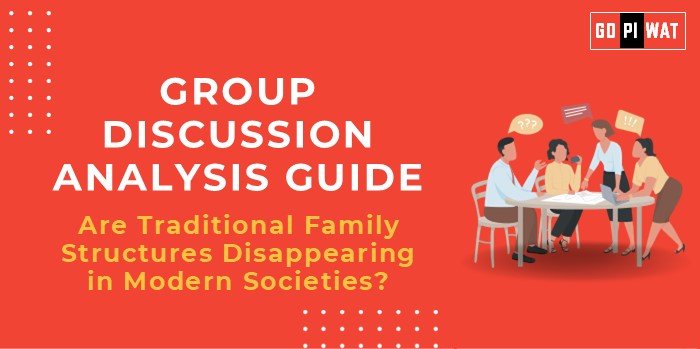📋 Group Discussion (GD) Analysis Guide: Are Traditional Family Structures Disappearing in Modern Societies?
🌐 Introduction to Traditional Family Structures
- 📖 Opening Context: Family structures globally are witnessing shifts, influenced by economic pressures, social norms, and the growing impact of urbanization. The evolution of the traditional family unit—from extended families to nuclear setups—is a significant trend in contemporary society.
- 📜 Topic Background: Traditionally, family structures consisted of extended members living together, often spanning multiple generations. This model provided social, economic, and emotional support. However, in recent decades, industrialization, migration, and modern lifestyles have led to smaller, nuclear family units, raising questions about the endurance of traditional family setups.
📊 Quick Facts and Key Statistics
- 🏠 Increase in Nuclear Families: In countries like India, nuclear families now constitute nearly 60% of households, with a 5% annual growth rate—reflecting a move away from extended family models.
- 💍 Marriage Rates Decline: Global marriage rates have decreased by about 23% since 2000, indicating shifting family and societal values.
- 🏡 Single-Person Households: Single-person households account for approximately 30% of all households in urbanized countries like Sweden and Japan.
- 👵 Aging Population Impact: Aging populations, particularly in countries like Japan (28% aged 65+), strain traditional family care systems, influencing younger family structures.
🔍 Stakeholders and Their Roles
- 👪 Families and Individuals: Adapt to changing lifestyles, balancing personal freedom with traditional values.
- 🏛️ Government: Implements policies affecting family leave, childcare support, and housing to accommodate new family structures.
- 🏢 Corporations and Employers: Shape work-life balance and family-friendly policies, affecting family cohesion.
- 🎭 Cultural Institutions: Influence societal norms regarding marriage, family roles, and caregiving responsibilities.
📈 Achievements and Challenges
- 🌟 Achievements:
- Empowerment of Individuals: Greater economic independence has allowed individuals to redefine family roles and relationships.
- Social Mobility: Increased mobility for work and education enables family members to explore individual goals.
- Inclusive Definitions: Growing acceptance of varied family models, such as single-parent and same-sex families, promotes inclusivity.
- ⚖️ Challenges:
- Erosion of Support Networks: As family structures become smaller, traditional support networks weaken, impacting child-rearing and elderly care.
- Economic Pressures: Rising living costs and dual-income needs often stress nuclear families.
- 🌍 Global Comparisons:
- Japan: High elderly population and fewer younger family members have created a care crisis, with the government stepping in to provide elderly care.
- Nordic Countries: Strong social welfare systems support diverse family models, including single-parent households.
- 📖 Case Studies:
- India: Rapid urbanization and changing lifestyles have led to a decline in extended families, especially in urban areas.
💡 Structured Arguments for Discussion
- ✅ Supporting Stance: “Traditional family structures are indeed disappearing as nuclear families and individualistic lifestyles become more prevalent.”
- ❌ Opposing Stance: “Despite changes, traditional values persist in many societies where family remains a core social unit.”
- ⚖️ Balanced Perspective: “While traditional family structures are evolving, the essence of family continues to adapt, balancing old and new values.”
🚀 Effective Discussion Approaches
- 📊 Opening Approaches:
- Statistical Introduction: “With nearly 60% of Indian households now nuclear, we see a clear shift in family structures…”
- Case Example: “In countries like Japan, the aging population presents challenges to traditional family caregiving roles…”
- 🔄 Counter-Argument Handling:
- Acknowledge the economic realities driving smaller families, while highlighting cultural resilience.
- Emphasize examples where traditional and modern structures coexist effectively, like multi-generational families adapting in urban settings.
⚙️ Strategic Analysis of Strengths and Weaknesses
- 🌟 Strengths:
- Economic independence promotes individual choice.
- Flexible family models adapt to modern needs.
- ⚠️ Weaknesses:
- Lessened support for caregiving and shared responsibilities.
- Increased isolation in single-person households.
- 🌱 Opportunities: Policy frameworks to support diverse family types.
- ⚡ Threats: Rising elderly care demands strain public and private resources.
📚 Connecting with B-School Applications
- 🌐 Real-World Applications: Social policies and business practices that accommodate family diversity can be valuable themes in management and operations studies.
- 📋 Sample Interview Questions:
- “How does the evolution of family structures impact consumer behavior in modern markets?”
- “In what ways could corporations contribute to maintaining family work-life balance?”
- 🎓 Insights for B-School Students:
- Understand the influence of family structures on societal roles.
- Recognize the implications of family evolution on marketing, HR, and organizational policies.


